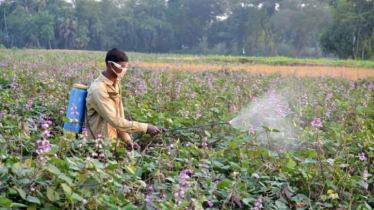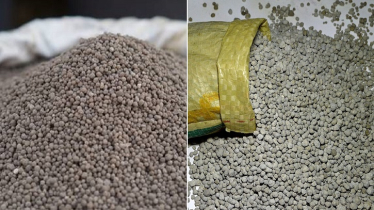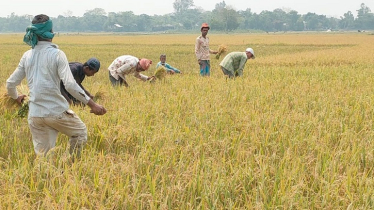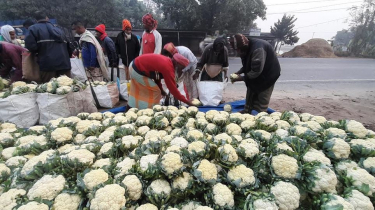
Flood-resilient vegetable farming is gaining popularity among char farmers and homemakers in the flood-prone areas of the district, as the method has proven profitable, sustainable, and largely risk-free.
The district, traversed by three major rivers—the Brahmaputra, the Teesta, and the Karatoa—faces seasonal, flash and untimely floods almost every year. These repeated floods frequently damage standing crops and wash away vegetables cultivated in homesteads and adjoining yards, leaving farmers, especially those in vulnerable char areas, anxious and hopeless about vegetable production.
With this challenge in mind, FRIENDSHIP, a Bangladesh-based international social purpose organization, introduced a flood-resilient vegetable cultivation technique using the hanging method. The initiative aims to help char farmers grow vegetables year-round in a sustainable, low-risk manner, ensuring both household nutrition and income generation through the sale of surplus produce.
The activity is being implemented in Sundarganj, Fulchhari and Sadar upazilas under the Assistance for Sustainable Development (ASD) Project, supported by FRIENDSHIP Luxembourg. As of November 20, a total of 240 farmers in the project areas have adopted the method and successfully cultivated bottle gourd, bean, pumpkin, cucumber, lalshak, data, radish and lady’s finger.
Farmers explained that the process begins by filling a sack with soil. Vegetable seeds are then sown on the soil-filled sack, which is hung from a bamboo pole supported by two posts. After germination, the growing plants and their vines are placed on a platform, locally known as macha or jangla, to allow proper expansion. This technique has enabled farmers to consistently achieve the expected yield, regardless of fluctuating flood conditions.
Maksuda Begum, a homemaker from Karaibari char in Kamarjani union under Sadar upazila, said the method is completely risk-free because the elevated platform prevents crops from being submerged during floods. She added that the vegetables grown through this technique meet her family’s needs and generate additional income, which has significantly helped her family overcome poverty-like circumstances. She noted that the method is steadily gaining popularity among other char farmers.
Kamarjani Union Parishad Chairman M. Matiar Rahman said he visited several households successfully applying the technique. Impressed by the results, more farmers in the char areas have shown keen interest in adopting the method. He added that the union parishad is encouraging farmers to practice hanging vegetable cultivation as a means to improve their economic conditions.
Project Manager Dibakar Biswas said farmers are selected and provided with need-based training to ensure proper implementation of the technique. Additionally, 240 sheep have been distributed among families in the project area to further promote income-generating activities alongside vegetable farming.
FRIENDSHIP founder and executive director Runa Khan said the organization is a non-political service provider dedicated to improving the lives of people living in disaster-prone regions of the country. She said the project aims to uplift the socio-economic conditions of vulnerable communities in the district’s flood-affected upazilas.





